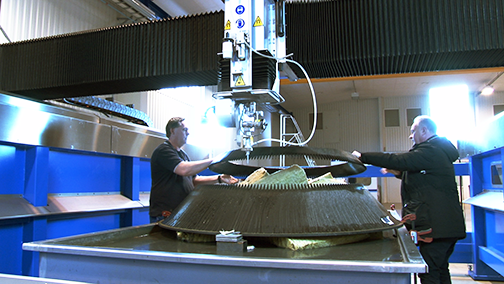
Sending satellites into orbit is today a large and global industry and, in Sweden is Water Jet Sweden.
They manufacture systems compatible with all commercial satellite buses available in the world today. Market leadership means constant investigation of ways to develop the rocket science even further. This time it led to new ways of processing their thick carbon fiber materials. The purpose of the Payload Adapter and Separation System is to bring a satellite into orbit. The systems ensure that satellite and rocket remain securely attached to one another during the tough journey into space, and then deliver the valuable payloads into orbit with precision.
Today's Payload Adapter is made out of aluminum and carbon fiber technology. The two parts are thoroughly bolted together into one big cone, several meters in diameter. The design has an impressive performance. Over 600 separations have been carried out in orbit with a 100 percent success rate.

However, calculations have shown that Payload Adapter Systems in 100 percent carbon fiber would improve weight and stiffness significantly. A design that could increase both rocket efficiency and investment payback. Instead of bolting the two Payload Adapter pieces together the same design as on glulam beams could be used — finger joints. A design that enables a big contact surface, a strong joint and is suitable when joining similar materials. As neither milling nor sawing was applicable for processing this kind of design, Water Jet Sweden was contacted to conduct live waterjet test cutting.
Tony Ryd, the CTO at Water Jet Sweden, explained that complex carbon fiber geometries are generally difficult to process efficiently without using waterjet cutting technology. The test was performed by cutting 47 mm long finger joints in a cone shaped 12 mm thick carbon fiber material with a circumference of 7.2 meters. The incision needed a tolerance of 0.1 mm around the circle, to be able to safely be glued together. A highly advanced FiveX machine system from Water Jet Sweden was chosen for the test. The company's FiveX machine system is unique as it has a combination of extreme precision and a full 3D abrasive cutting ability. It is specially designed for this kind of advanced applications, cutting with a repetition accuracy of +/- 0.025 mm, tells Tony Ryd.
The project was successful and proved that full carbon Payload Adapters are possible on future launch vehicles, and it showed that abrasive waterjet cutting is a suitable cutting technology for carbon materials and future rocket science.
After more than 30 years, Water Jet Sweden has become one of the leading European manufacturers of water jet cutting systems, with an international footprint and customers in more than 40 countries around the globe.

